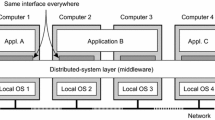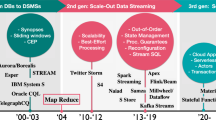Abstract
Many distributed services need to be scalable: internet search, electronic commerce, e-government\(\ldots \) In order to achieve scalability those applications rely on replicated components. Because of the dynamics of growth and volatility of customer markets, applications need to be hosted by adaptive systems. In particular, the scalability of the reliable multicast mechanisms used for supporting the consistency of replicas is of crucial importance. Reliable multicast may propagate updates in a pre-defined order (e.g., FIFO, total or causal). Since total order needs more communication rounds than causal order, the latter appears to be the preferable candidate for achieving multicast scalability, although the consistency guarantees based on causal order are weaker than those of total order. This paper provides a historical survey of different scalability approaches for reliable causal multicast protocols.







Similar content being viewed by others
Notes
Vector clocks are compared as follows:
\(VC(a) \le VC(b)\) iff \(\forall i, i \in \{1..n\} : VC(a)[i] \le VC(b)[i]\), and
\( VC(a) < VC(b)\) iff \(VC(a) \le VC(b) \wedge \exists i : VC(a)[i] < VC(b)[i]\).
References
Adly N, Nagi M (1995) Maintaining causal order in large scale distributed systems using a logical hierarchy. In: IASTED Intnl Conf on Appl Inform, pp 214–219
Aguilera MK, Chen W, Toueg S (1997) Heartbeat: a timeout-free failure detector for quiescent reliable communication. In: 11th Intnl Wshop on Distrib Alg (WDAG), Saarbrücken, pp 126–140
Almeida JB, Almeida PS, Baquero C (2004) Bounded version vectors. In: 18th Intnl Conf Distrib Comput (DISC), Amsterdam, pp 102–116
Almeida PS, Baquero C, Fonte V (2008) Interval tree clocks. In: 12th Intnl Conf Distrib Syst (OPODIS), Luxor, pp 259–274
Almeida S, Leitão J, Rodrigues LET (2013) ChainReaction: a causal+ consistent datastore based on chain replication. In: 8th EuroSys Conf, Czech Republic, pp 85–98
Álvarez A, Arévalo S, Cholvi V, Fernández A, Jiménez E (2008) On the interconnection of message passing systems. Inf Process Lett 105(6):249–254
Amir Y, Stanton J (1998) The Spread wide area group communication system. Tech. rep., CDNS-98-4, The Center for Networking and Distributed Systems, The Johns Hopkins Univ
Amir Y, Dolev D, Kramer S, Malki D (1992) Transis: a communication subsystem for high availability. In: 22nd Intnl Symp Fault-Tolerant Comp (FTCS), Boston, pp 76–84
Anastasi G, Bartoli A, Spadoni F (2001) A reliable multicast protocol for distributed mobile systems: design and evaluation. IEEE Trans Parallel Distrib Syst 12(10):1009–1022
Bailis P, Ghodsi A, Hellerstein JM, Stoica I (2013) Bolt-on causal consistency. In: Intnl Conf Mgmnt Data (SIGMOD), New York, pp 761–772
Baldoni R, Raynal M, Prakash R, Singhal M (1996) Broadcast with time and causality constraints for multimedia applications. In: 22nd Intnl Euromicro Conf, Prague, pp 617–624
Baldoni R, Friedman R, van Renesse R (1997) The hierarchical daisy architecture for causal delivery. In: 17th Intnl Conf Distrib Comput Syst (ICDCS), Maryland, pp 570–577
Ban B (2002) JGroups—a toolkit for reliable multicast communication. http://www.jgroups.org
Baquero C, Almeida PS, Shoker A (2014) Making operation-based CRDTs operation-based. In: 14th Intnl Conf Distrib Appl Interop Syst (DAIS), Berlin, pp 126–140
Benslimane A, Abouaissa A (2002) Dynamical grouping model for distributed real time causal ordering. Comput Commun 25:288–302
Birman KP, Joseph TA (1987) Reliable communication in the presence of failures. ACM Trans Comput Syst 5(1):47–76
Birman KP, Schiper A, Stephenson P (1991) Lightweigt causal and atomic group multicast. ACM Trans Comput Syst 9(3):272–314
Cachin C, Guerraoui R, Rodrigues LET (2011) Introduction to reliable and secure distributed programming, 2nd edn. Springer, Berlin
Chandra P, Gambhire P, Kshemkalyani AD (2004) Performance of the optimal causal multicast algorithm: a statistical analysis. IEEE Trans Parall Distr 15(1):40–52
Chandra TD, Toueg S (1996) Unreliable failure detectors for reliable distributed systems. J ACM 43(2):225–267
de Juan-Marín R, Cholvi V, Jiménez E, Muñoz-Escoí FD (2009) Parallel interconnection of broadcast systems with multiple FIFO channels. In: 11th Intnl Symp on Distrib Obj, Middleware and Appl (DOA), Vilamoura, LNCS, vol 5870, pp 449–466
Défago X, Schiper A, Urbán P (2004) Total order broadcast and multicast algorithms: taxonomy and survey. ACM Comput Surv 36(4):372–421
Demers AJ, Greene DH, Hauser C, Irish W, Larson J, Shenker S, Sturgis HE, Swinehart DC, Terry DB (1987) Epidemic algorithms for replicated database maintenance. In: 6th ACM Symp on Princ of Distrib Comput (PODC), Canada, pp 1–12
Du J, Elnikety S, Roy A, Zwaenepoel W (2013) Orbe: scalable causal consistency using dependency matrices and physical clocks. In: ACM Symp on Cloud Comput (SoCC), Santa Clara, pp 11:1–11:14
Fernández A, Jiménez E, Cholvi V (2000) On the interconnection of causal memory systems. In: 19th Annual ACM Symp on Princ of Distrib Comput (PODC), Portland, pp 163–170
Fidge CJ (1988) Timestamps in message-passing systems that preserve the partial ordering. In: 11th Australian Comput Conf, pp 56–66
Friedman R, Vitenberg R, Chockler G (2003) On the composability of consistency conditions. Inf Process Lett 86(4):169–176
Gilbert S, Lynch N (2002) Brewer’s conjecture and the feasibility of consistent, available, partition-tolerant web services. SIGACT News 33(2):51–59
Gray J, Helland P, O’Neil PE, Shasha D (1996) The dangers of replication and a solution. In: SIGMOD Conf, pp 173–182
Hadzilacos V, Toueg S (1993) Fault-tolerant broadcasts and related problems. In: Mullender S (ed) Distributed systems, chap 5, 2nd edn. ACM Press, pp 97–145
Johnson S, Jahanian F, Shah J (1999) The inter-group router approach to scalable group composition. In: 19th Intnl Conf on Distrib Comput Syst (ICDCS), Austin, pp 4–14
Kalantar MH, Birman KP (1999) Causally ordered multicast: the conservative approach. In: 19th Intnl Conf on Distrib Comput Syst (ICDCS), Austin, pp 36–44
Kawanami S, Enokido T, Takizawa M (2004) A group communication protocol for scalable causal ordering. In: 18th Intnl Conf on Adv Inform Netw Appl (AINA), Fukuoka, pp 296–302
Kawanami S, Nishimura T, Enokido T, Takizawa M (2005) A scalable group communication protocol with global clock. In: 19th Intnl Conf on Adv Inform Netw Appl (AINA), Taipei, pp 625–630
Kshemkalyani AD, Singhal M (1998) Necessary and sufficient conditions on information for causal message ordering and their optimal implementation. Distrib Comput 11(2):91–111
Kshemkalyani AD, Singhal M (2011) Distributed computing: principles, algorithms, and systems, 2nd edn. Cambridge University Press, New York
Ladin R, Liskov B, Shrira L, Ghemawat S (1992) Providing high availability using lazy replication. ACM Trans Comput Syst 10(4):360–391
Lamport L (1978) Time, clocks, and the ordering of events in a distributed system. Commun ACM 21(7):558–565
Laumay P, Bruneton E, de Palma N, Krakowiak S (2001) Preserving causality in a scalable message-oriented middleware. In: Intnl Conf on Distrib Syst Platf (Middleware), pp 311–328
Liu N, Liu M, Cao J, Chen G, Lou W (2010) When transportation meets communication: V2P over VANETs. In: 30th Intnl Conf Distrib Comput Syst (ICDCS), Genova
Lwin CH, Mohanty H, Ghosh RK (2004) Causal ordering in event notification service systems for mobile users. In: Intnl Conf Inform Tech: Coding Comput (ITCC), Las Vegas, pp 735–740
Mahajan P, Alvisi L, Dahlin M (2011) Consistency, availability and covergence. Tech. rep., UTCS TR-11-22, The University of Texas at Austin
Matos M, Sousa A, Pereira J, Oliveira R, Deliot E, Murray P (2009) CLON: overlay networks and gossip protocols for cloud environments. In: 11th Intnl Symp on Dist Obj, Middleware and Appl (DOA), Vilamoura, LNCS, vol 5870, pp 549–566
Mattern F (1989) Virtual time and global states of distributed systems. In: Parallel and distributed algorithms, North-Holland, pp 215–226
Mattern F, Fünfrocken S (1994) A non-blocking lightweight implementation of causal order message delivery. Lect Notes Comput Sci 938:197–213
Meldal S, Sankar S, Vera J (1991) Exploiting locality in maintaining potential causality. In: 10th ACM Symp on Princ of Distrib Comp (PODC), Montreal, pp 231–239
Meling H, Montresor A, Helvik BE, Babaoglu Ö (2008) Jgroup/ARM: a distributed object group platform with autonomous replication management. Softw Pract Exp 38(9):885–923
Mosberger D (1993) Memory consistency models. Oper Syst Rev 27(1):18–26
Mostéfaoui A, Raynal M (1993) Causal multicast in overlapping groups: towards a low cost approach. In: 4th Intnl Wshop on Future Trends of Distrib Comp Syst (FTDCS), Lisbon, pp 136–142
Mostéfaoui A, Raynal M, Travers C, Patterson S, Agrawal D, El Abbadi A (2005) From static distributed systems to dynamic systems. In: 24th Symp on Rel Distrib Syst (SRDS), Orlando, pp 109–118
Nishimura T, Hayashibara N, Takizawa M, Enokido T (2005) Causally ordered delivery with global clock in hierarchical group. In: ICPADS (2), Fukuoka, pp 560–564
Parker DS Jr, Popek GJ, Rudisin G, Stoughton A, Walker BJ, Walton E, Chow JM, Edwards DA, Kiser S, Kline CS (1983) Detection of mutual inconsistency in distributed systems. IEEE Trans Softw Eng 9(3):240–247
Pascual-Miret L (2014) Consistency models in modern distributed systems. An approach to eventual consistency. Master’s thesis, Depto. de Sistemas Informáticos y Computación, Univ. Politècnica de València
Pascual-Miret L, González de Mendívil JR, Bernabéu-Aubán JM, Muñoz-Escoí FD (2015) Widening CAP consistency. Tech. rep., IUMTI-SIDI-2015/003, Univ. Politècnica de València, Valencia
Peterson LL, Buchholz NC, Schlichting RD (1989) Preserving and using context information in interprocess communication. ACM Trans Comput Syst 7(3):217–246
Pomares Hernández S, Fanchon J, Drira K, Diaz M (2001) Causal broadcast protocol for very large group communication systems. In: 5th Intnl Conf on Princ of Distrib Syst (OPODIS), Manzanillo, pp 175–188
Prakash R, Baldoni R (2004) Causality and the spatial-temporal ordering in mobile systems. Mobile Netw Appl 9(5):507–516
Prakash R, Raynal M, Singhal M (1997) An adaptive causal ordering algorithm suited to mobile computing environments. J Parallel Distrib Comput 41(2):190–204
Raynal M, Schiper A, Toueg S (1991) The causal ordering abstraction and a simple way to implement it. Inf Process Lett 39(6):343–350
Rodrigues L, Veríssimo P (1995a) Causal separators and topological timestamping: An approach to support causal multicast in large-scale systems. Tech. Rep. AR-05/95, Instituto de Engenharia de Sistemas e Computadores (INESC), Lisbon
Rodrigues L, Veríssimo P (1995b) Causal separators for large-scale multicast communication. In: 15th Intnl Conf on Distrib Comput Syst (ICDCS), Vancouver, pp 83–91
Schiper A, Eggli J, Sandoz A (1989) A new algorithm to implement causal ordering. In: 3rd Intnl Wshop on Distrib Alg (WDAG), Nice, pp 219–232
Schiper N, Pedone F (2010) Fast, flexible and highly resilient genuine FIFO and causal multicast algorithms. In: 25th ACM Symp on Applied Comp (SAC), Sierre, pp 418–422
Shapiro M, Preguiça NM, Baquero C, Zawirski M (2011) Convergent and commutative replicated data types. Bull EATCS 104:67–88
Shen M, Kshemkalyani AD, Hsu TY (2015) Causal consistency for geo-replicated cloud storage under partial replication. In: Intnl Paral Distrib Proces Symp (IPDPS) Wshop, Hyderabad, pp 509–518
Singhal M, Kshemkalyani AD (1992) An efficient implementation of vector clocks. Inf Process Lett 43(1):47–52
Sotomayor B, Montero RS, Llorente IM, Foster IT (2009) Virtual infrastructure management in private and hybrid clouds. IEEE Internet Comput 13(5):14–22
Stephenson P (1991) Fast ordered multicasts. PhD thesis, Dept. of Comp. Sc., Cornell Univ., Ithaca
Stonebraker M (1986) The case for shared nothing. IEEE Database Eng Bull 9(1):4–9
Vogels W (2009) Eventually consistent. Commun ACM 52(1):40–44
Wischhof L, Ebner A, Rohling H (2005) Information dissemination in self-organizing intervehicle networks. IEEE Trans Intell Transp 6(1):90–101
Yavatkar R (1992) MCP: a protocol for coordination and temporal synchronization in multimedia collaborative applications. In: 12th Intnl Conf on Distrib Comput Syst (ICDCS), Yokohama, pp 606–613
Yen LH, Huang TL, Hwang SY (1997) A protocol for causally ordered message delivery in mobile computing systems. Mobile Netw Appl 2(4):365–372
Zawirski M, Preguiça N, Duarte S, Bieniusa A, Balegas V, Shapiro M (2015) Write fast, read in the past: causal consistency for client-side applications. In: 16th Intnl Middleware Conf, Vancouver
Zhou S, Cai W, Turner SJ, Lee BS, Wei J (2007) Critical causal order of events in distributed virtual environments. ACM Trans Mult Comp Commun Appl 3(3):15
Acknowledgments
This work was supported by European Regional Development Fund (FEDER) and Ministerio de Economía y Competitividad (MINECO) under research Grant TIN2012-37719-C03-01.
Author information
Authors and Affiliations
Corresponding author
Rights and permissions
About this article
Cite this article
de Juan-Marín, R., Decker, H., Armendáriz-Íñigo, J.E. et al. Scalability approaches for causal multicast: a survey. Computing 98, 923–947 (2016). https://doi.org/10.1007/s00607-015-0479-0
Received:
Accepted:
Published:
Issue Date:
DOI: https://doi.org/10.1007/s00607-015-0479-0




